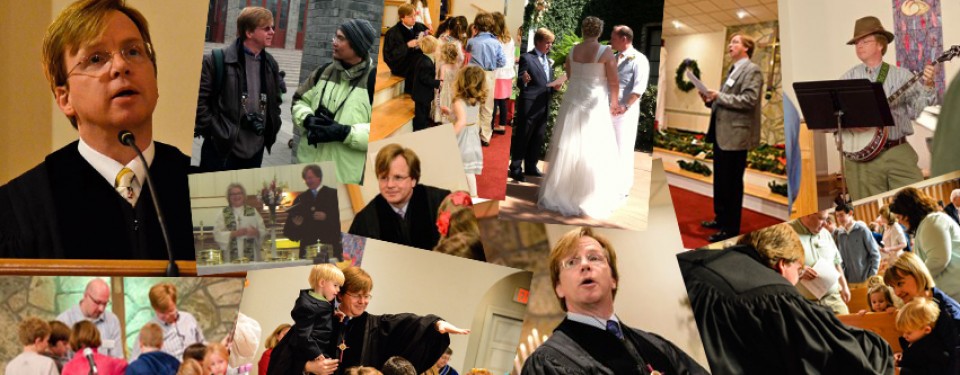When I lived in Belmont, MA I would often see an old man – big beard, thick graying hair (though going a little thin on the top) with a Mediterranean-looking complexion. He usually stood near the exit of the store: not saying anything, just standing there. His clothes were neat, but obviously old and worn. Yet, no one saw him. Yet, no one saw him: he was ignored as if he didn’t exist. His face, stoic as it was, always seemed to me to be filled with a hurt pride: doing what he had to do to survive, yet once having lived a life far better than the one he has now.
A few Sundays ago, at the beginning of Advent, I was asked to give the “Childrens’ Message” at my church – appropriate (or ironic, depending on how you look at it) since at the time, my son was due to be born any day. I warned my fellow worship leaders that this might interfere with my being there — making it difficult for me to give the Childrens’ Message! I said that if it happened, I would be invisible (even though everyone would know why), but that I would be “present in spirit”.
Yet, there is another kind of invisibility: the invisibility of those who are unseen.
When I lived in Belmont I would shop at the supermarket at Belmont Ave and Mt Auburn Road, not far from “Mt Auburn Cemetery” where so many notable Americans have been buried. While shopping there, I would often see an old man – big beard, thick graying hair (though going a little thin on the top) with a Mediterranean-looking complexion. He usually stood near the exit of the store: not saying anything, just standing there. His clothes were neat, but obviously old and worn. Yet, no one saw him: he was ignored as if he didn’t exist. His face, stoic as it was, always seemed to me to be filled with a hurt pride: doing what he had to do to survive, yet once having lived a life far better than the one he has now.
Not many people think about it, but there is an abandoned railroad spur that runs behind that store: it starts as a branch off of the “Red Line” near Alewife, runs behind Fresh Pond Mall, through Fresh Pond Park, past many industrial buildings and Mt. Auburn Cemetery, before it dead ends at the Lexus dealership near the Arsenal in Watertown. It is heavily overgrown, with at least four bridges where it passes under major roads.
Such an overgrown area in the middle of suburbia is a perfect hideaway for the homeless: trees, old buildings and overpasses provide excellent shelter. Recycle and trash bins provide excellent foraging for cans and bottles to redeem at the supermarket. (I often see the homeless in the area: pushing grocery carts piled-high with cans, bottles, and their worldly possessions, searching in our garbage cans anything that they can use or redeem.)
These are the real “invisible” people: living right alongside us, sometimes sleeping just a few yards from our bedroom windows, but we never see them, we never acknowledge them, we never engage with them. — Just like that old man I saw so many times at the Shaws in Belmont.
In this Holiday season, we often talk about how Jesus, the babe is a gift from God to the world. (…John 3:16!) Yet, we often forget that this gift is to the world, not just us. That world includes the homeless, the hungry, the poor. Also, the gift wasn’t “stuff” rather, God gave of himself.
I’m reminded of another poor man I once knew – “Old George” – who had just enough money from his Social Security Check to pay his rent, and that was all. He survived as so many of the poor in this area survive – scrounging tin cans and bottles so that he could buy food. He was renowned for being verbally abusive and mean to people, but he changed. The change came not because he got more money or was given more “stuff” but because someone I knew invited him to lunch. She befriended him, and saw him as a person. She gave of herself, her own time: showing him that he mattered, that he wasn’t just a forgotten and poor old man.
As the friendship with him continued, he began to take the love and friendship he was receiving and “spread it around” to others. The thing that changed him as a person is that he learned that someone cared. So, in this Christmas season I ask myself: how am I showing that “I care” to those around me? How will that old man at the Shaws Market in Belmont know that he matters to God, unless I show him – as Jesus taught us to do?
Next time I’m in that neighborhood, I’ll seek him out and say “Hi, my name’s Allen: what’s your name?”
I wonder if he’ll be hungry.
Copyright (c) 2009, Allen Vander Meulen III, all rights reserved. I’m happy to share my writings with you, as long as you are not seeking (or getting) financial benefit for doing so, and as long as proper credit for my authorship is given (via mention of my name on your site, or a link back to this site).






